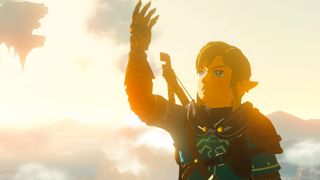Zelda: Tears of the Kingdom made me feel helpless in its first few hours – and I'm still chasing that buzz
I'm unsuccessfully chasing the thrill of Tears of the Kingdom's first few helpless hours
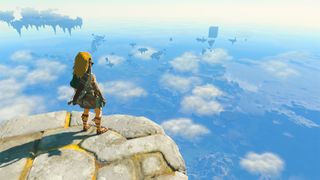
I'd be willing to bet my house on the fact I'm the only person playing The Legend of Zelda: Tears of the Kingdom and being reminded of Grand Theft Auto: Chinatown Wars. Granted, I first played the latter top-down action-adventure game from 2009 on another of Nintendo's handheld consoles – the Nintendo DS – but the obvious, personal comparisons for me end there.
Technically, visually, mechanically, and thematically, these two games really couldn't be any more different. But one similarity at ground level stands, and that's both games' scope for making you feel insignificant and totally worthless in a world that wants nothing more than to swallow you whole. Protagonists Link and Huang Lee are not cut from the same cloth in any shape or form, but they are both forced to fight against the odds from the outset, like few other stories in their respective game series.
Wasted
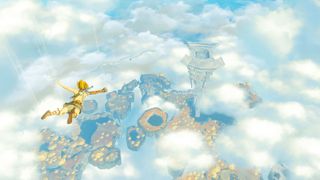
Verticality plays a huge part in Link's early stumbles in Tears of the Kingdom. In Breath of the Wild, our intrepid hero was required to scale cloud-grazing towers from the off in order to unlock specific portions of the Hyrule map – but these were short trips predominantly designed to facilitate the acquisition of a glider. Tears of the Kingdom starts in similar style, but with Link surfacing 30,000 feet above sea level in Great Sky Island, every floating platform presents a potentially fatal pitfall. Almost immediately, Link is forced to climb knife-edged peaks, navigate deadly river rapids, adverse winds, and survive the coldest climes in his quest for Light of Blessings.
Even in its quieter moments, the action unfolds much quicker here than it ever did in Breath of the Wild, not least when approaching enemy encampments – these bastions now packed with foes on multiple levels, so as to encourage creative use of Link's new Fuse, Ultrahand, Recall and Ascend abilities. It's in these moments where you're let off the leash a little in combat that Tears of the Kingdom shines – and while this has been true throughout my almost-40-hour first playthrough so far, there was a distinguished thrill at the very outset, when I was properly underpowered and green, that's been lost along the way.
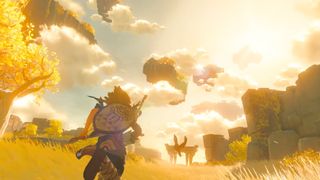
Anyone with even a passing interest in the Grand Theft Auto series will know of each game's rags to riches underpinnings. It's true of every game, mainline and offshoot, that the hero of the story starts out broke and works their way up (or in the case of GTA 5's Michael De Santa, back up) to the top; from a life of relative squalor, to one of opulence and excess. The same is true of Grand Theft Auto: Chinatown Wars, but this game's learning curve is steeper than that of its crime sim counterparts, as protagonist Huang Lee is pulled deeper and deeper into the drug trade.
At first he does so somewhat reluctantly, before it becomes his bread and butter, and his nefarious pathway to the highlife. At the beginning of the game, however, without two quarters to rub together, I found myself robbing civilians in the street of their loose change. I held up liquor stores at gunpoint for whatever was in the till, and used my meager ill-gotten gains to buy hard drugs to sell on street corners. It was an awful way to get ahead, of course, but as a GTA series veteran, it was also the first game that made me work so hard to shift the dial even the tiniest bit.
Cover me
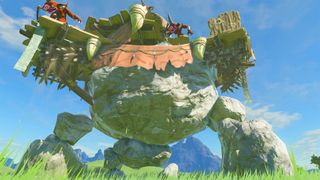
"I'm not sure if I'll ever hit those early highs again in Hyrule, but I'm delighted to have had them – and even happier to continue searching."
And so, as I camped in the long grass opposite a Bokoblin stronghold in Hyrule, with three hearts to my name, a stick with a rock fused onto the end, and a pot lid for a shield, I was reminded of Huang Lee doing stick-ups on old men on the streets of Liberty City. The buzz of flying so close to failure was second to none, knowing that each move had to be mapped out meticulously, lest I get ambushed and killed. Often, I'd weigh up the value of storming a 10-strong HQ against the size of its treasure chest which, all going well, I'd ultimately raid among the dead bodies of my foes.
Sign up to the GamesRadar+ Newsletter
Weekly digests, tales from the communities you love, and more
A few dozen hours in, with several more heart containers to my name, a proper handle on my abilities, and access to some of the game's deadliest weapons, encounters of this style are no longer as thrilling in Tears of the Kingdom. And while I appreciate this is true of the vast majority of video games, few games have left me chasing the dragon in the same way – which is testament to how well Tears of the Kingdom beds you in, and then proceeds to dangle the carrot before you as you march into its mid-game zones and storylines.
Elden Ring was the last game of similar stature that swallowed my time like Tears of the Kingdom has, but while there are few early boss battles that shake you up quite like that run-in with Limgrave's Tree Sentinel, the fact that it can be circumvented entirely makes weighing risk and reward easier. In Tears of the Kingdom, though – like Grand Theft Auto: Chinatown Wars – those hard-fought encounters are just too enticing to bypass. I'm not sure if I'll ever hit those early highs again in Hyrule, but I'm delighted to have had them – and even happier to continue searching.
26 game developers explain why Zelda: Tears of the Kingdom will be talked about for years.

Joe is a Features Editor at GamesRadar+. With over seven years of experience working in specialist print and online journalism, Joe has written for a number of gaming, sport and entertainment publications including PC Gamer, Edge, Play and FourFourTwo. He is well-versed in all things Grand Theft Auto and spends much of his spare time swapping real-world Glasgow for GTA Online’s Los Santos. Joe is also a mental health advocate and has written a book about video games, mental health and their complex intersections. He is a regular expert contributor on both subjects for BBC radio. Many moons ago, he was a fully-qualified plumber which basically makes him Super Mario.
Most Popular



